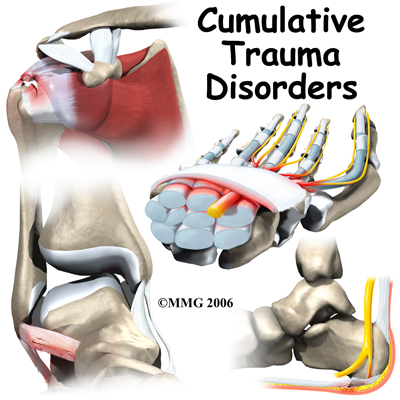What can I expect with treatment?
Getting treated right away for symptoms of CTD can shorten the time it takes to heal. Symptoms can sometimes go away within two to four weeks when steps are taken quickly to address the factors that may be causing your symptoms. However, people who keep doing activities when they have symptoms and don't seek help right away may be headed for a long and frustrating recovery time, perhaps as long as a year.
At Eastwood Physiotherapy many nonsurgical treatment approaches are used by our physiotherapy and occupational therapists to reduce the symptoms of CTD-related conditions. Our physiotherapist will want to gather more information and will further evaluate your condition. The answers you give along with the results of the examination will guide us in tailoring a treatment program that is right for you.
Our physiotherapists often begin by teaching patients relaxation techniques which may include helping you learn to breathe deeply by using your diaphragm muscle. Taking the time to relax and breathe deeply eases tense muscles and speeds nutrients and oxygen to sore tissues.
We may suggest that you wear a splint initially to protect and rest the sore area. Anti-inflammatory drugs, suggested by your doctor, are often used together with therapy treatments, which may include heat, ice, ultrasound, or gentle hands-on stretching to reduce pain or other symptoms. Our physiotherapist may use muscle stretching to restore muscle balance and to improve your posture and alignment. We sometimes apply stretches that are designed to help nerves glide where they course from the spine to the arms or legs. Strengthening exercises are also used to restore muscle balance and to improve your ability to use healthy postures throughout the day.
Our physiotherapist will pay close attention to your posture and movement patterns. You may receive verbal instruction and hands-on guidance to improve your alignment and movement habits. Helping you see and feel normal alignment improves your awareness about healthy postures and movements, allowing you to release tension and perform your activities with greater ease.
We will spend time helping you understand more about CTD and why you are experiencing symptoms. Our physiotherapist may provide tips on how to combat symptoms at work using rest and relaxation. You may also be given specific stretches and exercises to do at work. Our physiotherapist may visit your work place to analyze your job site and to watch how you do your job tasks. Afterward, we can recommend changes to help you do your job with less strain and less chance of injury. These changes are usually inexpensive and can make a big difference in helping you be more productive with less risk of pain or injury.
At Eastwood Physiotherapy, our goal is to help you understand your condition, to look for and change factors that may be causing your symptoms, and to help you learn how to avoid future problems. When your recovery is well underway, regular visits to our office will end. Although we will continue to be a resource, you will be in charge of practicing the strategies and exercises you've learned as part of an ongoing home program.
Eastwood Physiotherapy provides services for physiotherapy in Edmonton.


